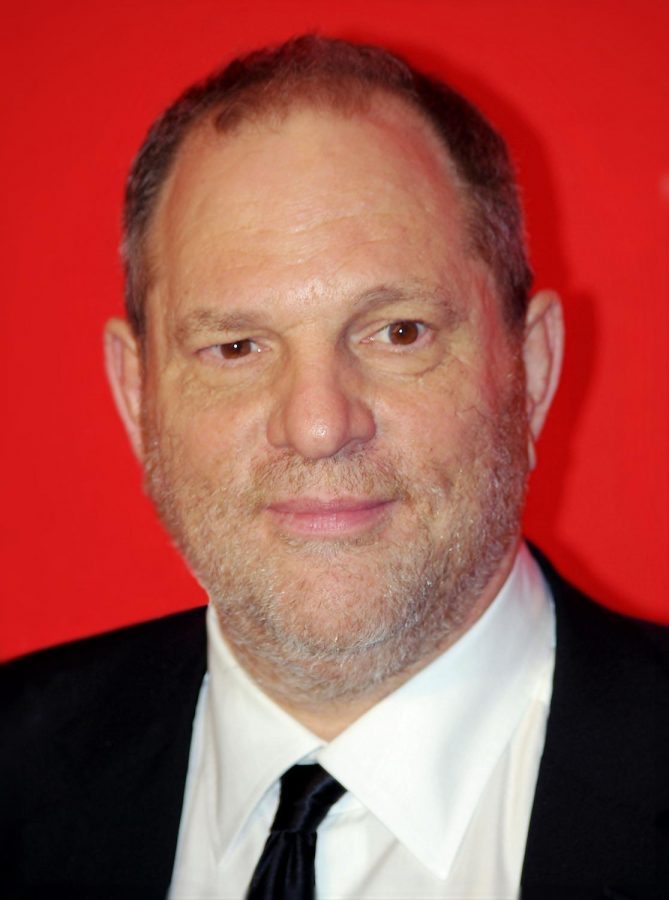Rowland: Harvey Weinstein sentencing, a monumental verdict for the #MeToo movement
After a lengthy trial, Harvey Weinstein was convicted for multiple sex crimes.
March 26, 2020
The New York prosecution of movie mogul Harvey Weinstein drew to a close on March 11 when he was sentenced to 23 years in prison for multiple sex crimes. He received a sentence of 20 years for criminal sex act and three years for rape. Six main female witnesses came forward to testify against Weinstein, but more than 80 have come forward in total.
Weinstein’s sentence will most likely be elongated, as he will be extradited to Los Angeles for felony charges of forcible rape, forcible oral copulation, sexual penetration by use of force and sexual battery by restraint. Evidence convicting him includes interviews with current and former employees and film industry workers, legal records, as well as emails and internal documents from Miramax and the Weinstein Company.
Weinstein still refuses to acknowledge any of his heinous actions, instead insisting that he believed that all of the cases of rape, sexual assault and sexual harassment were entirely consensual.
“I’m not going to say these aren’t great people, I had wonderful times with these people, you know,” Weinstein told CNN about his accusers. “It is just I’m totally confused and I think men are confused about all of these issues.”
Weinstein’s rhetoric is commonly repeated in the media, as many people seem to be afraid that the actions they have deemed acceptable in terms of sexual conduct will result in criminal charges. An environment of contrived fear seems to have arisen as many men feel indignant to change questionable and violating patterns of disrespect towards women.
Lisa Bloom, one of Weinstein’s attorneys, compared him to “an old dinosaur learning new ways” when questioned about his criminal actions. It seems as if this type of comparison is frequently embedded into the minds of the public, as we often believe that attackers simply “didn’t know any better” or “didn’t realize their actions were wrong.” To this presumption, I would then respond that the concept of consent should not have to be learned, as everyone should be viewed as an autonomous being that should never be violated.
If a person is worried that their actions will result in criminal charges, I would advise dropping any and all behavior that could be deemed as invasive or inappropriate. If the action can be viewed as inappropriate, it most likely is. If you treat others with respect and constantly establish consent you do not have to be confused about “all of these issues.”
Weinstein’s crimes were revealed around two and a half years ago when the “New York Times” published an article detailing numerous accounts of sexual assault and harassment by Weinstein. Prominent public figures such as Angelina Jolie, Gwyneth Paltrow, Ashley Judd and Rose McGowan came forward, prompting the formation of the #MeToo movement, an incredible phenomenon.
The movement focuses on revealing the experiences of sexual assault or harassment victims. The hashtag #MeToo was actually created in 2006 on MySpace, but it did not gain popularity until 2017 when Weinstein’s accusers shared their story. Its aim is to foster an environment of solidarity among victims and show that tolerance for sexual misconduct will no longer abide. They have also created a Legal Defense Fund for victims, which you can donate to here.
Weinstein’s sentencing is a landmark victory for women everywhere. Cases such as Brock Turner’s dissuade hope, as the blame is often placed on the woman for what she was wearing, whether or not she was intoxicated, what her past sexual activity entailed, and her overall appearance. Or, in Turner’s case, sympathy for the attacker’s “bright future” or past accomplishments result in no sentencing or a lesser sentencing. The fact that no such unjust treatment was afforded to Weinstein points to a better future.
However, one has to raise the question of whether or not Weinstein’s fair sentencing was because of his prominent accusers. His trial was highly publicized, and there was a fair amount of public pressure to convict him. The women who brought forward charges are mainly wealthy, famous, white actresses or models, most of whom are household names. Would the same media coverage and due process be given to those who are not in a position of power?
Oftentimes, victims of sexual assault are less powerful than their accusers. This common power disparity usually causes women to stay quiet and not report the incident fearing they do not have the resources to fight back against their attacker. Out of every 1,000 sexual assaults, 995 perpetrators walk free, only 230 are reported, only 46 of those 230 lead to arrest and only 4.6 will face jail time. That means that only 0.46 percent of perpetrators will face the consequences of what they did.
Some may counter this statistic with a common question: what about false rape accusations? Well, only 5.9 percent of rape accusations are provably false. However, this statistic must be digested with context: provably false does not mean that the rape did not occur, it simply means it could not be proved. If the accused possesses a foolproof alibi, the accuser eventually recants, or there was not enough evidence to bring charges, cases are oftentimes dropped. This means that the false rape accusation percentage is actually much lower, meaning that a rape accusation should always be taken seriously instead of regarded with an air of suspicion.
Weinstein’s sentencing opens up a discussion about the way that we view sexual assault and harassment, which will hopefully create change in the way our justice system views these heinous crimes.











Alex Archer • Mar 29, 2020 at 12:50 pm
Wonderfully written. Incredibly important topic as well. Never stop writing please, you’re gonna change the world